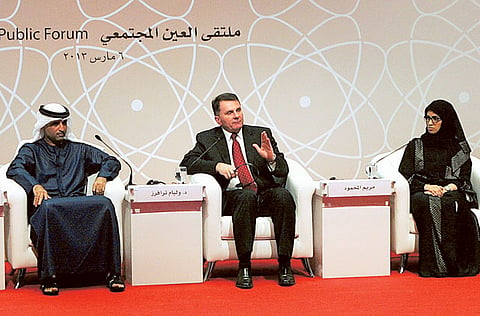UAE nuclear programme eyes ‘gold standard’
Regulatory organisation all praise for safety and design parameters of power plants

Al Ain: The tsunami-induced disaster at Japan’s Fukushima nuclear plant in 2011 offered insights that led to radical design changes to ensure the maximum safety level at the planned nuclear power plants in the UAE, nuclear energy experts have been assured.
A severe earthquake and resulting tsunami that wrecked Fukushima’s power plant in March 2011 raised serious safety concerns for the world, said Dr William Travers, Director General of the Federal Authority for Nuclear Regulation (FANR). “We did change things as we’re reviewing the first two Barakah plants at that time,” said Dr Travers as he addressed the FANR Forum on Wednesday night.
The Korean builders of the UAE nuclear facilities, he said, have incorporated the required changes in the plants’ design to withstand any seismological activity. They were “serious design changes,” in addition to the safeguards recommended by the International Atomic Energy Agency (IAEA), Dr Travers said.
He said the UAE’s nuclear power plants would be completely safe since they had incorporated the latest technologies unlike the Fukushima plant.
The UAE is currently working on plans to have four nuclear power reactors operational in Barakah by 2020, to generate 5.6 GWe of electricity. The first plant has been under construction since July 2012, with a South Korean consortium awarded a multi-billion-dollar contract. The plan, named Barakah 1, will be ready by 2017.
Dr Travers said the FANR is a regulatory authority that advises on safety and safeguard standards and issues licences for nuclear activities including the handling of radioactive material and radiation sources used in medicine, research, oil exploration, and other industries.
To a question on the management of nuclear waste, he said many countries had been facing such questions. The UAE has been looking for a number of available options but has not yet finalised a strategy. “When the government will select a strategy, we will evaluate it in accordance with the IAEA guidelines,” he added.
He said that a disaster management plan should be in place. “The likelihood of a nuclear disaster is very small but even then you need to have a plan,” he said responding to another question from the audience. A contingency plan is currently being developed in coordination with various UAE organisations, he said, adding that it would be fully tested once ready.
Dr Travers said the UAE made certain decisions that set concerns to rest at the very beginning of its ambitious nuclear programme. Most notably, it assured the world that its programme is intended for peaceful purposes, mainly to generate electricity. The UAE also pledged not to enrich uranium within its borders or reprocess the nuclear waste. These are the two activities which, if a country chooses to pursue them, pushes a civil nuclear programme into the military realm, he said. “With all these assurances and commitment to nuclear non-proliferation, the UAE’s programme is of gold standard,” said the FANR chief.
The forum hosted by the FANR at Al Ain Municipality’s theatre was its second in the UAE. The first was in Ghayathi last month. The aim of the forums is to introduce the FANR’s role in ensuring the safety, security and peaceful nature of the nuclear programme in the UAE. The FANR will be conducting similar public forums in other cities.
Sign up for the Daily Briefing
Get the latest news and updates straight to your inbox
